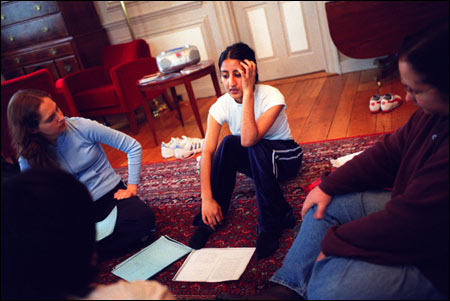‘V’: Not just for Valentine’s Day anymore:
Play ‘Vagina Monologues’ performed by two Harvard groups to raise consciousness, oppose violence

In anticipation of Feb. 14, two groups of Harvard students are preparing to mark the occasion not with hearts and cupids but with a consciousness-raising celebration of the other V: vagina.
Dudley House Drama, composed of students in the Graduate School of Arts and Sciences (GSAS), will perform Eve Ensler’s play “The Vagina Monologues” Friday and Saturday (Feb. 7 and 8), giving the runaway off-Broadway hit a casual, nontraditional treatment.
And the following week, Athena Theater Company offers up its interpretation of the show in performances Feb. 13 – 15. Both performances are in conjunction with V-Day, a national movement which mobilizes Valentine’s Day performances of “The Vagina Monologues” to help stop global violence against women and girls. The two Harvard performances are among 656 V-Day performances on college campuses around the country.
If V-Day uses polite nomenclature to vaguely suggest related words that begin with V, “The Vagina Monologues” is unambiguous in language and intent. The play, a series of monologues – some poignant, some painful, many very funny – based on interviews with women about their vaginas, has challenged many theatergoers with its unflinching discussions of female genitalia and sexuality.
Getting beyond ‘eew’
Uzma Hasan, director of the Dudley House Drama production, has chosen a dramatic setting and rehearsal techniques aimed at helping actors and audience relax so the play can achieve its powerful impact. The performance, in the Dudley House Dining Hall, will have the six actors seated on cushions among the audience, the space enclosed by drapes.
Rehearsals with the cast – which includes herself, four women and one man – begin with movement then discussion that’s focused on personal experiences: When did you first get your period? Have you seen a vagina other than your own? What would your vagina say if it could talk?
Schedule of performances:
Dudley House Drama, Feb. 7, 9 p.m., Feb. 8, 2:30 and 8 p.m., Dudley House Dining Hall, Lehman Hall, tickets: $10, $8 students and seniors.
Athena Theater Company, Feb. 13 – 15, 8 p.m., Agassiz Theater, Radcliffe Yard, tickets: $8, $6 students and seniors
Tickets to both performances available at the Harvard Box Office: (617) 496-2222
“It’s a scary thing. It’s something we’re not supposed to talk about,” says Hasan, who is a special student in GSAS on a Kennedy Scholarship for one year. Yet the play demands frank talk about vaginas in all forms and functions: reproductive, sexual, playful, loving, violent.
“If the cast can be as comfortable with each other and the material as possible, I think we can help make the audience a little less ‘eew,’” Hasan adds.
In “The Little Coochi Snorcher That Could,” delivered in a deep Southern accent by sociology student Lydia Bean, the substitution of “coochi snorcher” for “vagina” hardly blunts the impact of a young woman’s memories of important events in the life of her vagina. She relates fear and forbidding, injury and horrific violence, and, finally, love in the embrace of an older woman who “does everything to me and my coochi snorcher that I always thought was nasty before. And wow.”
The feisty “My Angry Vagina,” a tirade against scented douches, gynecologists’ visits, and thong underwear, takes on heightened humor in the voice of GSAS special student Ben Moxham. The only man in the production, Moxham nonetheless devotes himself to his character, tapping into her middle-aged, upper-class frustration as he declares, “My vagina’s furious and it needs to talk.”
Hasan, an actor and stage manager who’s making her directorial debut with this production, admits that she’s made choices – such as including a man in the cast – that are surprising.
“‘The Vagina Monologues’ has kind of got this whole aura around it. That’s something I was keen to play around with a bit,” she says.
While Dudley Drama’s production is part of V-Day, Hasan is wary of aligning it too strictly to an anti-violence agenda, choosing instead to emphasize the intimacy of its storytelling.
“It’s fun,” she says, and she and the cast are working to keep that first and foremost. “If you’re trying to de-demonize vaginas or women’s bodies, I think you’ve got to be a bit tongue-in-cheek about it, which is what I’m hoping to inject into this production,” Hasan adds.
Understanding the female body
Emily Leithauser ’05, director of the Athena Theater Company’s second annual V-Day production of “The Vagina Monologues,” hopes her production strikes an emotional balance.
“The play is varied in its tone,” she says. “There are a lot of moments of humor, but there’s also sadness. We’re trying to make it serious in addressing those issues.”
Quincy House Senior Tutor Maria Trumpler, lecturer in history of science, delivers the play’s “Vagina Facts,” anatomical accuracies and sobering statistics, as herself, an expert, lending gravity to the performance.
Athena Theater Company, an all-female troupe, taps 20 actresses for the work, which is flexible in its production requirements.
“I’m trying to play around with it a little,” says Leithauser. While most productions feature simply clad actresses delivering monologues from a bare stage, Athena’s production costumes the actresses and puts them in context. Onstage, layers of pink curtains evoke a vagina.
“The idea is that we’re performing in this anatomical space,” says Leithauser. “We’re penetrating the female body and understanding it more as we go along.”
Leithauser’s motives for the Athena production are more overtly political than Dudley House Drama’s, which is not surprising given Athena’s origin as a space for women.
“I think there’s a lot of sexism on campus that we need to address,” says Leithauser. “Women’s rights have not completely been won.”




